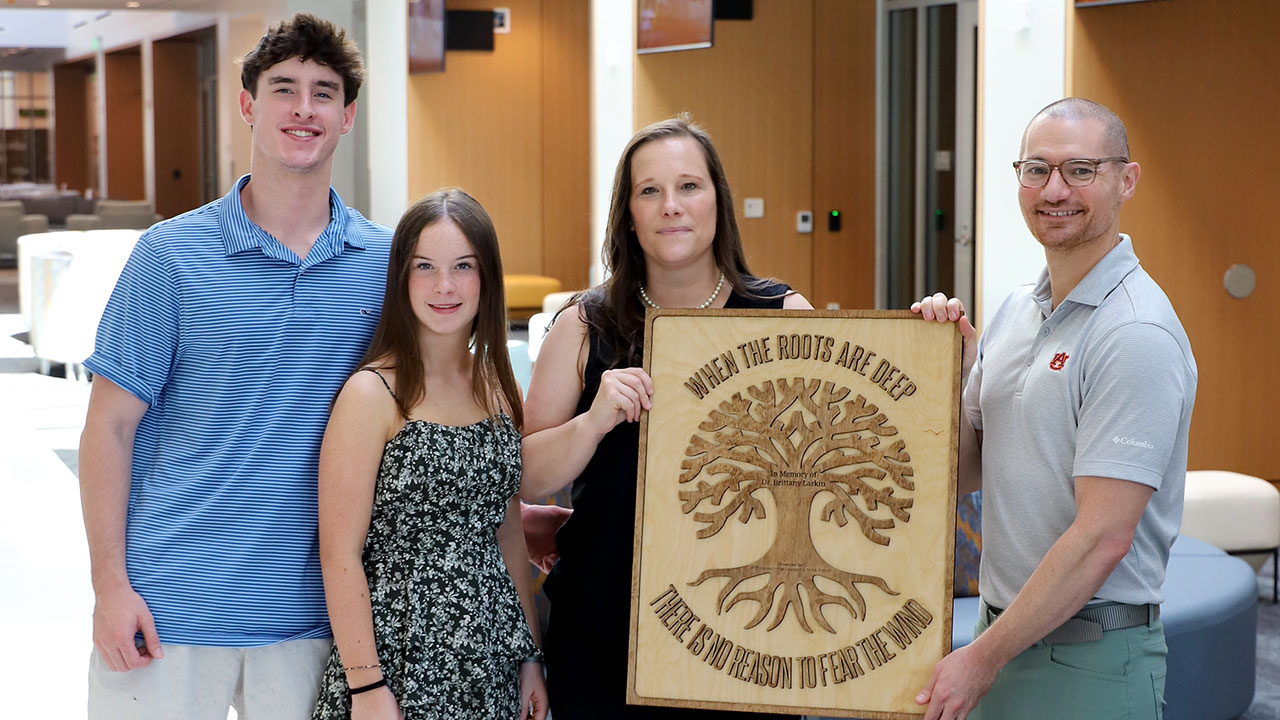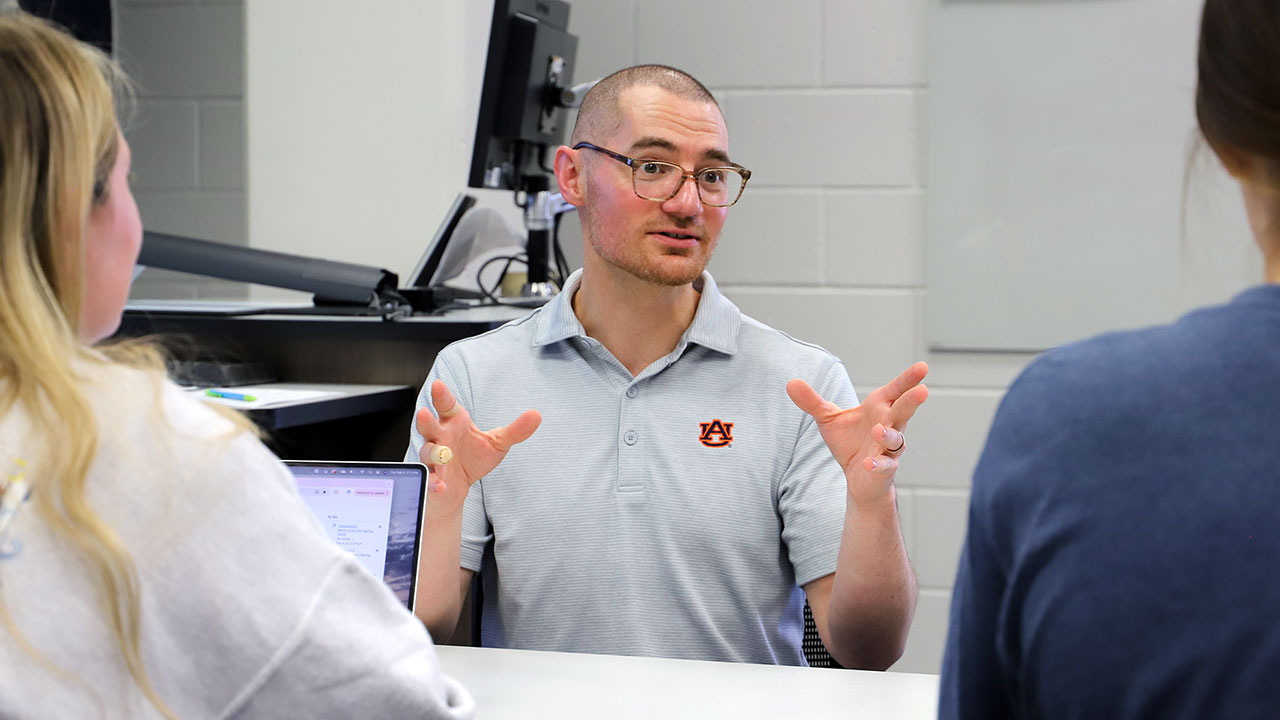content body

The family of Brittany Larkin is pictured with Auburn College of Education Associate Professor Andrew Pendola inside the College of Education's new building. Posing with a wooden memorial in honor of Larkin are (from left): Larkin's children, Jacob (who is finishing his sophomore year in accounting at Auburn) and Reese; Larkin's sister, Brandi King; and Pendola.
He didn’t realize it at the time, but Auburn University College of Education associate professor Andrew Pendola’s research involving a new school funding formula for Alabama was not only focused on the future of students but was based on the past work of a late colleague.
“I didn’t know it coming in, but I was using Dr. Larkin’s work while researching the topic and couldn’t believe how spot on it was—although I never connected the dots,” said Pendola, referring to the efforts a decade ago by former Auburn College of Education professor Brittany Larkin, who passed away in 2017 at the age of 38 following a seven-month battle with cancer. “It wasn’t until later when a colleague told me about Dr. Larkin—that I was now teaching the courses that she used to teach, that her memorial hung outside my office door—that I felt something was going on that was a little bigger, a little more important, and a lot more meaningful.”
Recently, Larkin’s past work was furthered to fruition with the dedicated efforts of Pendola, whose research briefs provided insightful data as state legislators considered and recently passed a new K-12 school funding formula for Alabama known as the RAISE (Renewing Alabama's Investment in Student Excellence) Act, which will distribute additional education dollars based on student needs. With its passage, Alabama becomes the 46th state to adopt a weighted student funding model. The new formula will operate alongside Alabama’s 30-year-old Foundation Program, which remains in place as a base layer. The RAISE formula adds targeted dollars for students who face greater challenges, including poverty, disabilities and language barriers.

Auburn College of Education standout professor and researcher Brittany Larkin is pictured.
A long time coming
“This has been a long time coming. Dr. Brittany Larkin began writing about this nearly a decade ago for Alabama, and across the country, more and more states were adopting student-weighted funding formulae,” Pendola said. “There has been a growing body of research on the positive effects—not only on students—but on broader aspects, such as teacher satisfaction, the workforce and housing prices.”
Pendola said school funding is so crucial to the success of schools and communities, and so he did all he could to provide research data guidance along the way as state legislators eyed a new approach to supporting schools throughout Alabama.
“When other nearby states began to revamp their school funding a few years back, I started getting involved with some of the policy and advocacy organizations in the state,” he said. “I attended whatever meetings I could go to on the topic and soon had a network of similarly interested policy researchers, journalists, advocates, and organizations. One day, word got out that members of the legislature were open to the idea—and before you knew it, there were meetings and hearings in Montgomery on the issue.”
An evidence-based approach
Pendola provided support by writing briefs about his research involving the impacts of funding reform and made sure members of the legislature received them.
“I figured the best thing I could do to support all the excellent advocates and organizations pushing for funding reform was to act as a trustworthy source of information,” he said. “So, I started doing some research on the impacts of funding reform and writing short, two-page policy briefs to hand out to the members of the legislature. I tried to pack in all the evidence they’d need to make a thoughtful, evidence-based, and even-handed decision. I also wrote the local papers, sent emails like mad, and tried to show up to every meeting I could to lay out a few talking points.”
He said he had two main points he wanted to make clear:
“First, targeted school funding is good for everyone,” he said. “Not just students with additional resource needs—it helps all students by making sure there is money where it is needed. It helps teachers focus on what helps students, and it helps schools keep track of what funds need to go where.
“Second, education spending is economic development. Investments in education pay back huge economic and social dividends, such as more economic draw, local jobs, and an improved housing market. I know this should be obvious, but I think we forget about it, and it is nice to show the data that supports it.”
That data also represents the work of a new Plains Research Consortium that Pendola and several of his fellow colleagues have started recently in the College of Education. The consortium was created to serve as a non-partisan, leading voice in educational policy and actionable health insights. Pendola added that Jason Meadows, a key member of the Every Child Alabama Coalition, was instrumental in ensuring that such insights reached the policymakers who helped make a difference.
“The Plains Research Consortium was a game changer in supporting the research and dissemination. Working on research with the PRC helped to provide a guarantee that the research is transparent, nonpartisan, and evidence-based,” he said. “So, when I’m handing out research briefs to people who don’t know me very well, they can trust that my recommendations are not spun in a certain direction and are based on an even-handed account of the best evidence we have.”
“It has been humbling to trace Dr. Larkin’s work, to see how it laid the foundation to even start considering the issue, and now to see it become reality. Truly, this could not be done without her. We stand on the shoulders of giants.”
A lasting legacy
Since realizing Larkin’s foundational work that supported Pendola’s research, Pendola has been in contact with Larkin’s family.
Larkin’s sister, Brandi King, said she is grateful to Pendola for advancing her sister’s work and ultimately continuing her legacy. She said it comes as no surprise to her family that her sister’s work was so impressive and helpful in support of Pendola’s research.
“From the very beginning, Britt was a born leader,” King said. “My mom used to say she was born at 16, because even as a child, she carried herself with the poise and clarity of someone who knew exactly who she was and what she wanted from life. She never waited for permission to lead. She just did. And she expected a lot from the people she loved. That expectation wasn’t pressure. It was a belief in our potential. Britt didn’t want us to just think. She wanted us to think deeply. She challenged us to see beyond the surface, to question the systems around us, and to never settle for easy answers.”
King said her sister’s passion was education.
“She began her journey working with young children and those with specific learning needs, students who often go unseen,” King said. “She had a heart for every child, especially the most vulnerable, and she saw how the system too often failed them. That realization sparked a fire in her that would guide the rest of her life.”
King added that “Britt didn’t just want to change one classroom. She wanted to change the system. So she went back to school, earned her Ph.D. in Educational Leadership and Policy, and focused on what so many avoid, educational finance. She knew that to truly make an impact, she had to educate the educators and influence the policymakers. She saw how outdated laws and broken funding formulas were not just holding schools back, they were harming children. She knew change wouldn’t be easy. But Britt never backed down from a challenge. She would never say, ‘Why me?’ She’d say, ‘Why not me?’”
King said her sister visited schools that couldn’t keep the lights on. It broke her heart but also fueled her determination.
“She united people, led from the front, and brought compassion and intelligence to every conversation,” she said. “And she made real change. Her students, some of whom are now principals, carry her teachings forward. Her scholarship and publications continue to guide new generations. Her children, her greatest pride, embody her brilliance and her values. And now, the funding formula she helped create will touch the lives of millions of students and educators in the years to come.”
Pendola said his hope is that the end result will be an even brighter future for the students of Alabama.
“If this research has, in any way, helped contribute to a better education for kids, then the job has been done,” he said. “While I’m hoping it helps make each and every school in Alabama a little bit better, I’ll sleep well if it helped any school improve.”
Looking to the College of Education’s wooden memorial in honor of Larkin and its carved message—”When the roots are deep, there is no reason to fear the wind“—Pendola says he is grateful to have played a part in furthering the reach and impact of his late colleague’s work.
“It has been humbling to trace Dr. Larkin’s work, to see how it laid the foundation to even start considering the issue, and now to see it become reality,” he said. “Truly, this could not be done without her. We stand on the shoulders of giants.”
Preparing outstanding educators, trainers and leaders
The College of Education's Department of Educational Foundations, Leadership, and Technology prepares exemplary educational practitioners and develops cooperative partnerships with university departments, schools, community agencies, and industry to provide outstanding educators, trainers and leaders.
Learn more




